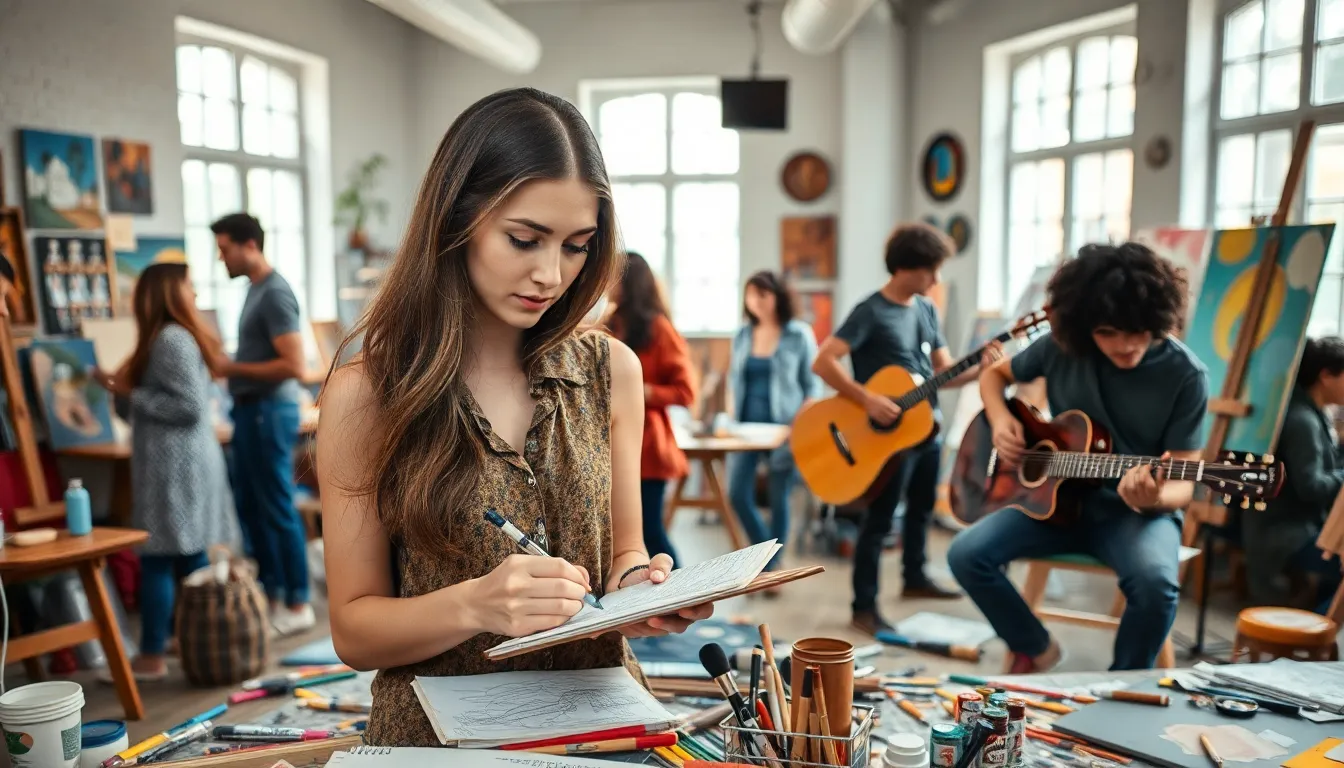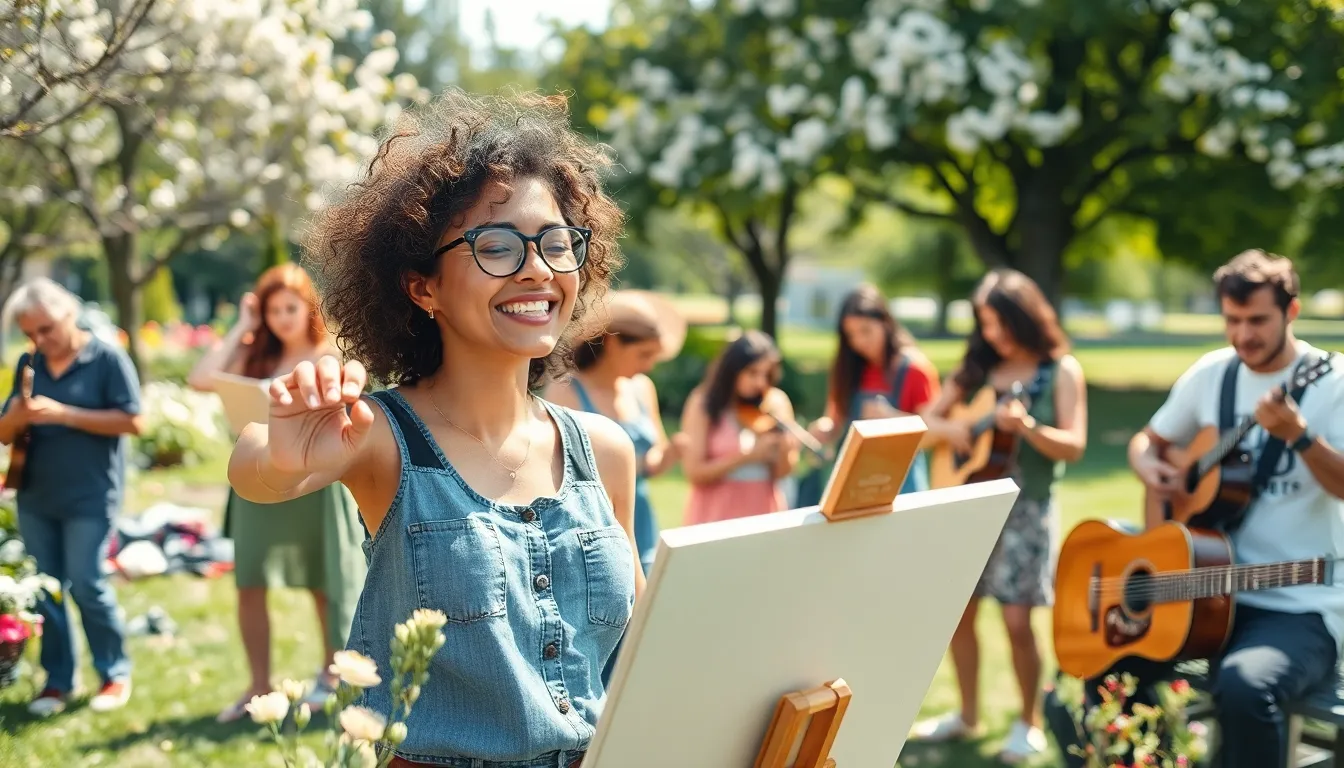Table of Contents
ToggleIn a world where creativity often takes a backseat to practicality, embracing an artistic mindset can be a game-changer. It’s not just for painters or poets; it’s for anyone looking to add a splash of color to their daily grind. Imagine transforming mundane tasks into vibrant expressions of your unique self—sounds tempting, right?
Understanding Artistic Mindset
An artistic mindset promotes creativity in daily life and encourages self-expression. This mindset encompasses a variety of characteristics that can enhance personal and professional experiences.
Definition and Characteristics
An artistic mindset features openness to new ideas and a willingness to experiment. Curiosity drives exploration while flexibility allows adaptation to changing circumstances. Individuals with this mindset often embrace failure as feedback and view challenges as opportunities. This approach fosters resilience and nurtures innovation. Creativity flourishes in environments that encourage collaboration and diverse perspectives. Moreover, artistic individuals tend to appreciate aesthetics and find beauty in ordinary moments.
Importance in Creative Fields
An artistic mindset significantly enhances innovation in creative fields. It inspires unique problem-solving solutions in arts, design, and media. Collaborators benefit from this mindset as it fosters a culture of experimentation and exploration. Many successful artists, designers, and writers attribute their achievements to nurturing this perspective. Creativity leads not only to original concepts but also strengthens team dynamics. Engaging with diverse ideas promotes richer outcomes in artistic projects. Embracing this mindset ultimately cultivates exceptional work in creative professions.
Developing an Artistic Mindset

An artistic mindset can transform everyday perceptions and experiences. Fostering creativity plays a crucial role in this process.
Cultivating Creativity
Creativity flourishes through diverse activities and new experiences. Engaging in daily practices, such as journaling or sketching, promotes creative thinking. Exploring art forms, including music or dance, encourages imaginative expression. Taking time for reflection enhances one’s ability to see connections between ideas. Surrounding oneself with inspiring environments ignites innovative thoughts. Participating in creative communities fosters collaboration and shared inspiration. Embracing different perspectives broadens understanding and stimulates artistic growth.
Embracing Failure
Failure serves as a vital learning opportunity in the creative process. Understanding that mistakes can lead to breakthroughs shifts the perspective. Accepting errors fosters resilience and adaptability in artistic pursuits. When individuals approach challenges with curiosity, they cultivate a growth mindset. Moreover, analyzing past failures reveals valuable insights for future projects. Persistence and experimentation often yield unexpected and rewarding results. Developing a supportive environment encourages taking risks and learning from missteps.
The Role of Environment
Environment plays a pivotal role in nurturing an artistic mindset. It shapes creativity and influences how ideas form and evolve.
Influences on Creativity
Surroundings heavily impact creative thinking. Natural light and organized spaces promote clarity and inspiration. Artistic individuals often find motivation in vibrant colors and stimulating textures. In contrast, cluttered environments may hinder focus, leading to frustration. Engaging with diverse cultures and experiences enriches artistic expression. New perspectives enhance creativity and spark innovative ideas.
Creating a Supportive Space
Designing a supportive space boosts creativity significantly. Comfort is essential, as a cozy atmosphere allows for relaxation and mental freedom. Access to inspiring art, books, and materials fosters creativity. Personal touches, such as favorite artwork or uplifting quotes, can invigorate the environment. Setting boundaries helps minimize distractions, permitting deeper focus on creative tasks. A well-structured workspace encourages organization, streamlining the creative process.
Benefits of an Artistic Mindset
An artistic mindset offers numerous benefits that extend beyond traditional art forms. Adopting this perspective can enhance various aspects of life.
Enhanced Problem Solving
Innovative thinking significantly improves when creativity guides problem-solving. Individuals approach obstacles with a fresh perspective, enabling outside-the-box solutions. Collaboration thrives in environments that encourage artistic expression, facilitating diverse ideas. Unique viewpoints emerge when people from different backgrounds share insights. Improved adaptability occurs as one learns to navigate challenges creatively, transforming failures into opportunities. Studies show that creative thinkers excel in generating multiple solutions, boosting overall effectiveness.
Improved Emotional Wellbeing
Artistic expression plays a crucial role in enhancing emotional health. Engaging in creative activities allows individuals to process feelings and reduce stress levels. Connection to one’s emotions deepens through journaling, painting, or playing music. Enhanced self-awareness arises, leading to a better understanding of personal experiences. Individuals often find joy in creating, resulting in improved mood and motivation. Positive social interactions develop when people share their artistic endeavors, fostered by a supportive community. Research supports the idea that creativity enhances resilience, contributing to long-term emotional stability.
Embracing an artistic mindset can significantly enrich one’s life. By viewing everyday tasks as opportunities for creativity, individuals unlock new levels of self-expression and innovation. This mindset fosters resilience and flexibility, enabling people to approach challenges with fresh perspectives.
Creating a supportive environment and engaging with diverse experiences further enhances this journey. As individuals cultivate their creativity, they not only improve their problem-solving skills but also nurture their emotional well-being. Ultimately, adopting an artistic mindset leads to a more fulfilling and vibrant life, where creativity becomes a powerful tool for personal growth and connection.




